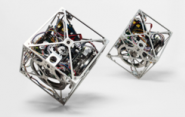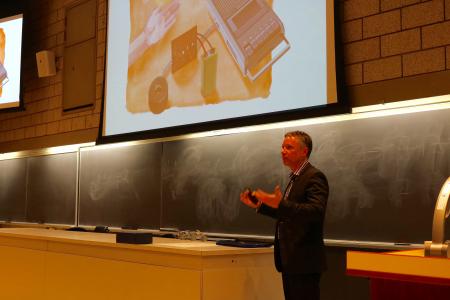In Nyquist Lecture, Raffaello D'Andrea Talks the Value of Curiosity

From jumping off the roof of his family’s home with a lawn umbrella to touring the world with Metallica, Raffaello D'Andrea explained Monday how a lifetime of curiosity led to his role in developing the next generation of autonomous machines and systems.
 A professor of dynamic systems and control at the Swiss Federal Institute of Technology (ETH), an entrepreneur and a popular TED speaker, D’Andrea was the 2018 Nyquist Lecture speaker. He told the audience at Davies Auditorium that he became curious about science when he was 11, a milestone year when he tried a number of experiments with mixed results.
A professor of dynamic systems and control at the Swiss Federal Institute of Technology (ETH), an entrepreneur and a popular TED speaker, D’Andrea was the 2018 Nyquist Lecture speaker. He told the audience at Davies Auditorium that he became curious about science when he was 11, a milestone year when he tried a number of experiments with mixed results.
"I wanted to learn about the physical world," he said. "So I jumped off the roof of my house with an umbrella." It didn’t turn out the way he expected, but he was unharmed and learned something about aerodynamics. The same year, he flooded his parents’ basement trying to make hydrogen and electrocuted himself trying to amplify a voltage.
As interested as he was about science, D'Andrea said he wanted to use it for direct applications – that’s why he turned to engineering.
“I realized that I was more interested in the act of creation than understanding how the physical world behaved for the sake of understanding it,” he said. “I wanted to exploit it and be able to create stuff.”
And he has created a lot. He helped develop the Cornell Robot Soccer Team, four-time world champions at the annual RoboCup competition. As founder of Kiva Systems (since bought by Amazon and operating as Amazon Robotics), he helped make warehouses a much more efficient place.
“Our solution took the best of people and robots,” he said. “Kiva takes pallets that come in and generates boxes of orders that come out. Thousands of these robots would pick up inventory and bring it to the perimeter of the warehouse where people would pick up the orders."
There are now more than 100,000 autonomous mobile robots deployed in Amazon warehouses alone.
With Verity Studios, which he co-founded in 2014, D’Andrea created a flying machine design and choreography that entails a swarm of very small drones lighting up the sky in swirling patterns. It’s been used for the winter Olympics’ ceremonies, Cirque du Soleil’s Paramour on Broadway, Metallica’s WorldWired tour, and was the Knicks opening act at Madison Square Garden in New York.
As a new media artist, his work intersects at the conceptual, visual and technological. His creations include a chair that falls apart and rebuilds itself, and a table that will follow you around. Among other venues, his exhibitions have been shown at the Venice Biennale, the FRAC Centre in Orleans, France and the National Gallery of Canada in Ottawa.
The lectureship is named in honor of Harry Nyquist, Ph.D. ’17, an important contributor to stability theory and information theory. Nyquist received the IRE Medal of Honor in 1960 for “fundamental contributions to a quantitative understanding of thermal noise, data transmission and negative feedback.” In October 1960, he was awarded the Stuart Ballantine Medal of the Franklin Institute “for his theoretical analyses and practical inventions in the field of communications systems during the past forty years including, particularly, his original work on the theories of telegraph transmission, thermal noise in electric conductors, and in the history of feedback systems.” In 1969, he was awarded the National Academy of Engineering’s fourth Founder’s Medal “in recognition of his many fundamental contributions to engineering.”
This lectureship was made possible through a generous gift from J. Robert Mann, Jr., B.E. ’51, Chairman of E-J Electric Installation Co., founded in 1899. He is the sponsor of the J. Robert Mann, Jr., Engineering Student Center and a recipient of the Yale Medal, Yale’s highest award to honor outstanding individual service to the University.

